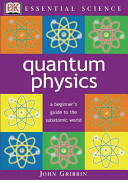Review: Quantum Physics

Quantum Physics (2002) is your one-stop primer on the quantum mechanical world — chock full of lucid explanation and revealing quotes by leading physicists. John Gribbin is among my favorite science writers, whose trade books always serve to illuminate physical realities in ways only a rarefied few can.
This addition to the Essential Science series begins with an introduction to classical mechanics, appropriately setting the stage for the quantum revolution that would follow. Far from a complete picture of reality, Newton’s laws of motion and Maxwell’s equations underpinning electrodynamics were only the beginning. And the quantum world proved almost infinitely more mysterious, disclosing a set of superordinary phenomena on nanoscopic scales that bewildered the likes of Einstein and Schrödinger and Feynman and the best minds of our day.
As Gribbin emphasizes frequently here, whether our brains can grasp the nature of quantum physics or not is irrelevant to its experimental efficacy. The specifics of quantum theory have been borne out in experiment after experiment, from subatomic supercolliders to the hydrogen bonding that holds our DNA together. Feynman’s calculations on QED reached the most precise agreement between theory and observation than any other in the history of science. Gribbin compares this level of precision to getting the distance between New York and LA correct within the width of a human hair (1/127th of an inch or 0.2 mm).
Some of the common applications of quantum theory, often taken for granted today, are also covered, such as laser technology used in CD, Blu-ray, and other optical disc formats and retinal surgery; silicon-based devices such as mobile phones and GPS; nuclear power; and, the next frontier, quantum computing.
Very little preliminary knowledge is required to gain from this book; the basics of atomic and subatomic theory will do. The included glossary and index are nice aids as well.
Quantum Physics (2002) is a wonderfully helpful little book on one of the most impenetrable topics in the world of science. As Feynman himself was fond of saying, you may not fully understand the sphinx that is QM. No one does, of course. But in learning about it, you’ll emerge from that dark alley a little less blind than you were before, and with a greater appreciation of cosmic complexity and its brute capacity for shattering our native intuition.
Note: This review is mirrored over at Goodreads and at Amazon.



Comments